Evaluating Training Requirements for Organic Farming in Myanmar
VerifiedAdded on 2023/03/23
|72
|22510
|51
Thesis and Dissertation
AI Summary
This dissertation explores the training needs of conventional farmers in Myanmar for transitioning to organic farming. It highlights the importance of organic farming for environmental sustainability and improved crop yields. The research employs a qualitative interview study with farmers in rural Myanmar, using open-ended questionnaires to identify their training needs and understand the relationship between age, education, experience, and these needs. The thematic analysis reveals a significant demand for training in organic farming practices, particularly among older farmers with less education and limited prior training. The study concludes that tailored training programs are essential to facilitate the adoption of organic farming methods, improve crop yields, and increase farmer revenue, while also addressing the challenges and perceptions surrounding the transition from conventional to organic agriculture.
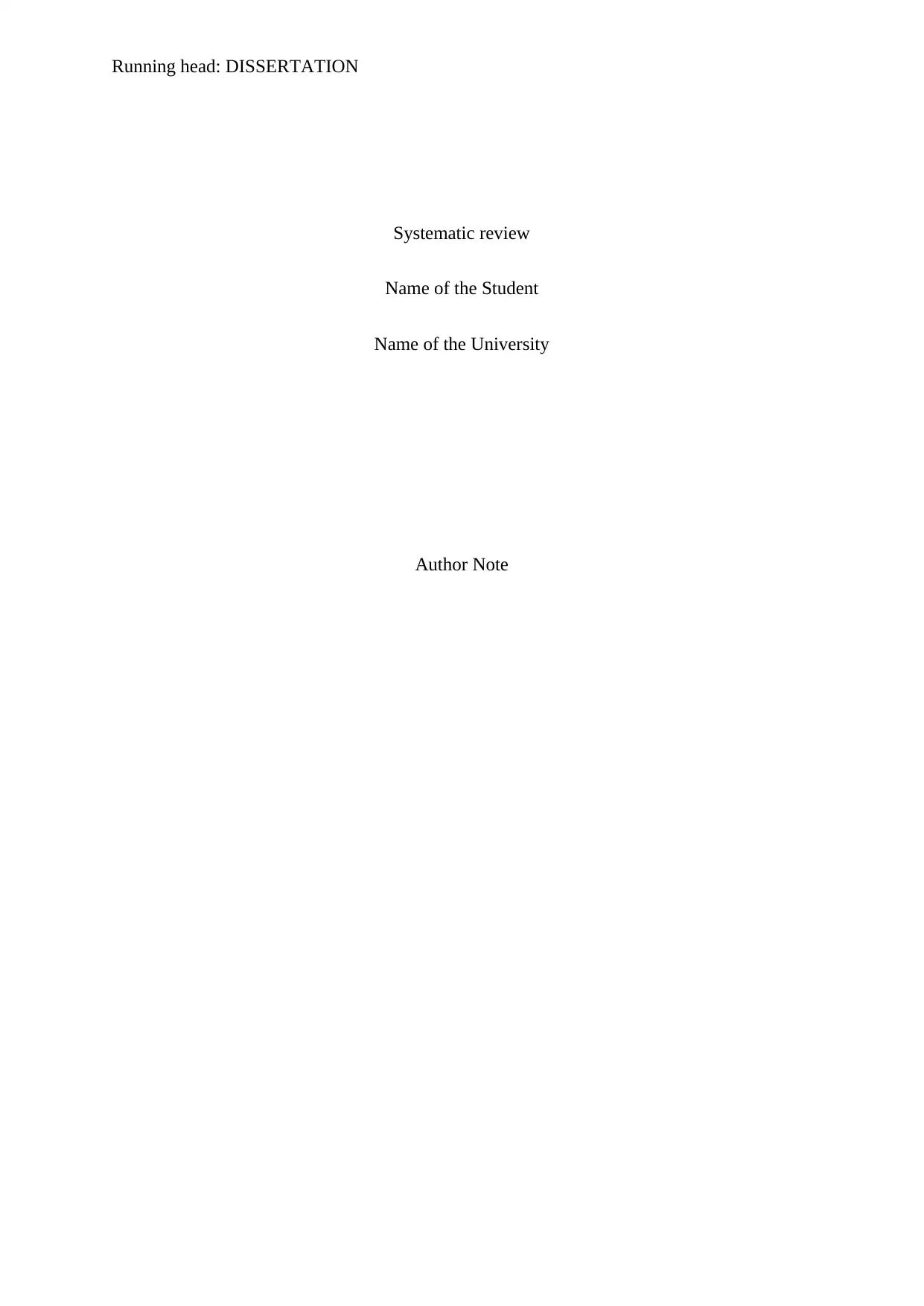
Running head: DISSERTATION
Systematic review
Name of the Student
Name of the University
Author Note
Systematic review
Name of the Student
Name of the University
Author Note
Paraphrase This Document
Need a fresh take? Get an instant paraphrase of this document with our AI Paraphraser
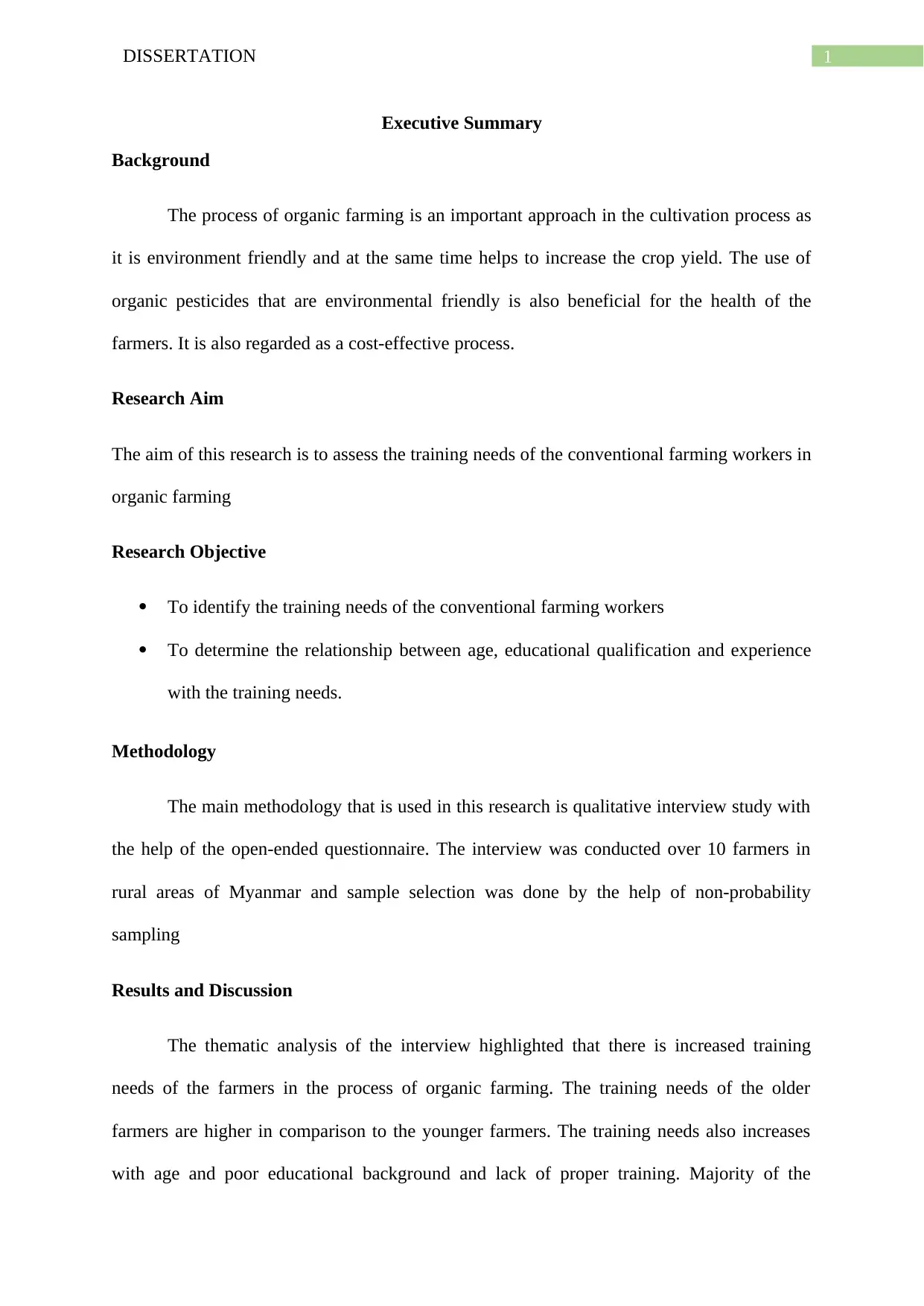
1DISSERTATION
Executive Summary
Background
The process of organic farming is an important approach in the cultivation process as
it is environment friendly and at the same time helps to increase the crop yield. The use of
organic pesticides that are environmental friendly is also beneficial for the health of the
farmers. It is also regarded as a cost-effective process.
Research Aim
The aim of this research is to assess the training needs of the conventional farming workers in
organic farming
Research Objective
To identify the training needs of the conventional farming workers
To determine the relationship between age, educational qualification and experience
with the training needs.
Methodology
The main methodology that is used in this research is qualitative interview study with
the help of the open-ended questionnaire. The interview was conducted over 10 farmers in
rural areas of Myanmar and sample selection was done by the help of non-probability
sampling
Results and Discussion
The thematic analysis of the interview highlighted that there is increased training
needs of the farmers in the process of organic farming. The training needs of the older
farmers are higher in comparison to the younger farmers. The training needs also increases
with age and poor educational background and lack of proper training. Majority of the
Executive Summary
Background
The process of organic farming is an important approach in the cultivation process as
it is environment friendly and at the same time helps to increase the crop yield. The use of
organic pesticides that are environmental friendly is also beneficial for the health of the
farmers. It is also regarded as a cost-effective process.
Research Aim
The aim of this research is to assess the training needs of the conventional farming workers in
organic farming
Research Objective
To identify the training needs of the conventional farming workers
To determine the relationship between age, educational qualification and experience
with the training needs.
Methodology
The main methodology that is used in this research is qualitative interview study with
the help of the open-ended questionnaire. The interview was conducted over 10 farmers in
rural areas of Myanmar and sample selection was done by the help of non-probability
sampling
Results and Discussion
The thematic analysis of the interview highlighted that there is increased training
needs of the farmers in the process of organic farming. The training needs of the older
farmers are higher in comparison to the younger farmers. The training needs also increases
with age and poor educational background and lack of proper training. Majority of the
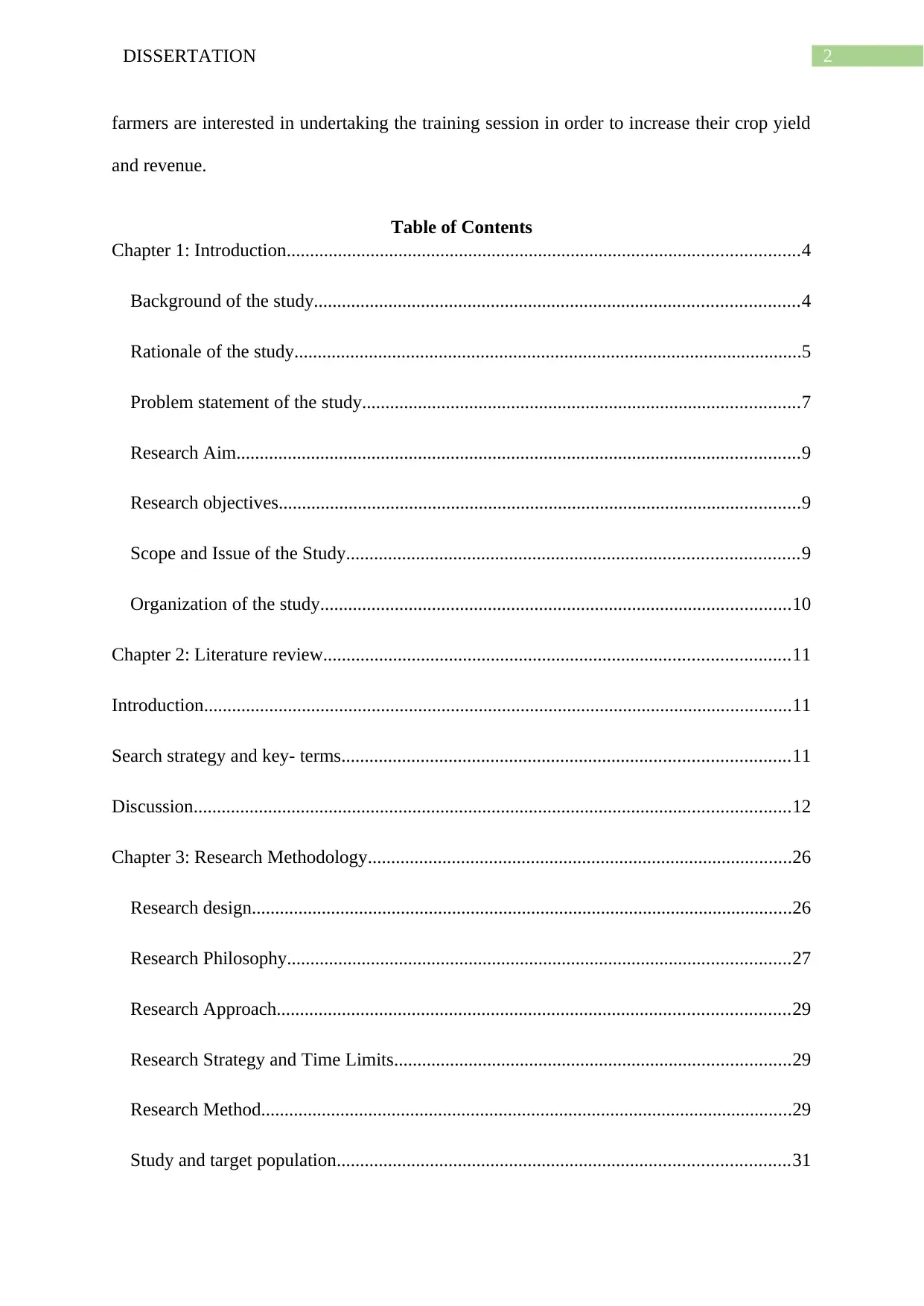
2DISSERTATION
farmers are interested in undertaking the training session in order to increase their crop yield
and revenue.
Table of Contents
Chapter 1: Introduction..............................................................................................................4
Background of the study........................................................................................................4
Rationale of the study.............................................................................................................5
Problem statement of the study..............................................................................................7
Research Aim.........................................................................................................................9
Research objectives................................................................................................................9
Scope and Issue of the Study.................................................................................................9
Organization of the study.....................................................................................................10
Chapter 2: Literature review....................................................................................................11
Introduction..............................................................................................................................11
Search strategy and key- terms................................................................................................11
Discussion................................................................................................................................12
Chapter 3: Research Methodology...........................................................................................26
Research design....................................................................................................................26
Research Philosophy............................................................................................................27
Research Approach..............................................................................................................29
Research Strategy and Time Limits.....................................................................................29
Research Method..................................................................................................................29
Study and target population.................................................................................................31
farmers are interested in undertaking the training session in order to increase their crop yield
and revenue.
Table of Contents
Chapter 1: Introduction..............................................................................................................4
Background of the study........................................................................................................4
Rationale of the study.............................................................................................................5
Problem statement of the study..............................................................................................7
Research Aim.........................................................................................................................9
Research objectives................................................................................................................9
Scope and Issue of the Study.................................................................................................9
Organization of the study.....................................................................................................10
Chapter 2: Literature review....................................................................................................11
Introduction..............................................................................................................................11
Search strategy and key- terms................................................................................................11
Discussion................................................................................................................................12
Chapter 3: Research Methodology...........................................................................................26
Research design....................................................................................................................26
Research Philosophy............................................................................................................27
Research Approach..............................................................................................................29
Research Strategy and Time Limits.....................................................................................29
Research Method..................................................................................................................29
Study and target population.................................................................................................31
⊘ This is a preview!⊘
Do you want full access?
Subscribe today to unlock all pages.

Trusted by 1+ million students worldwide
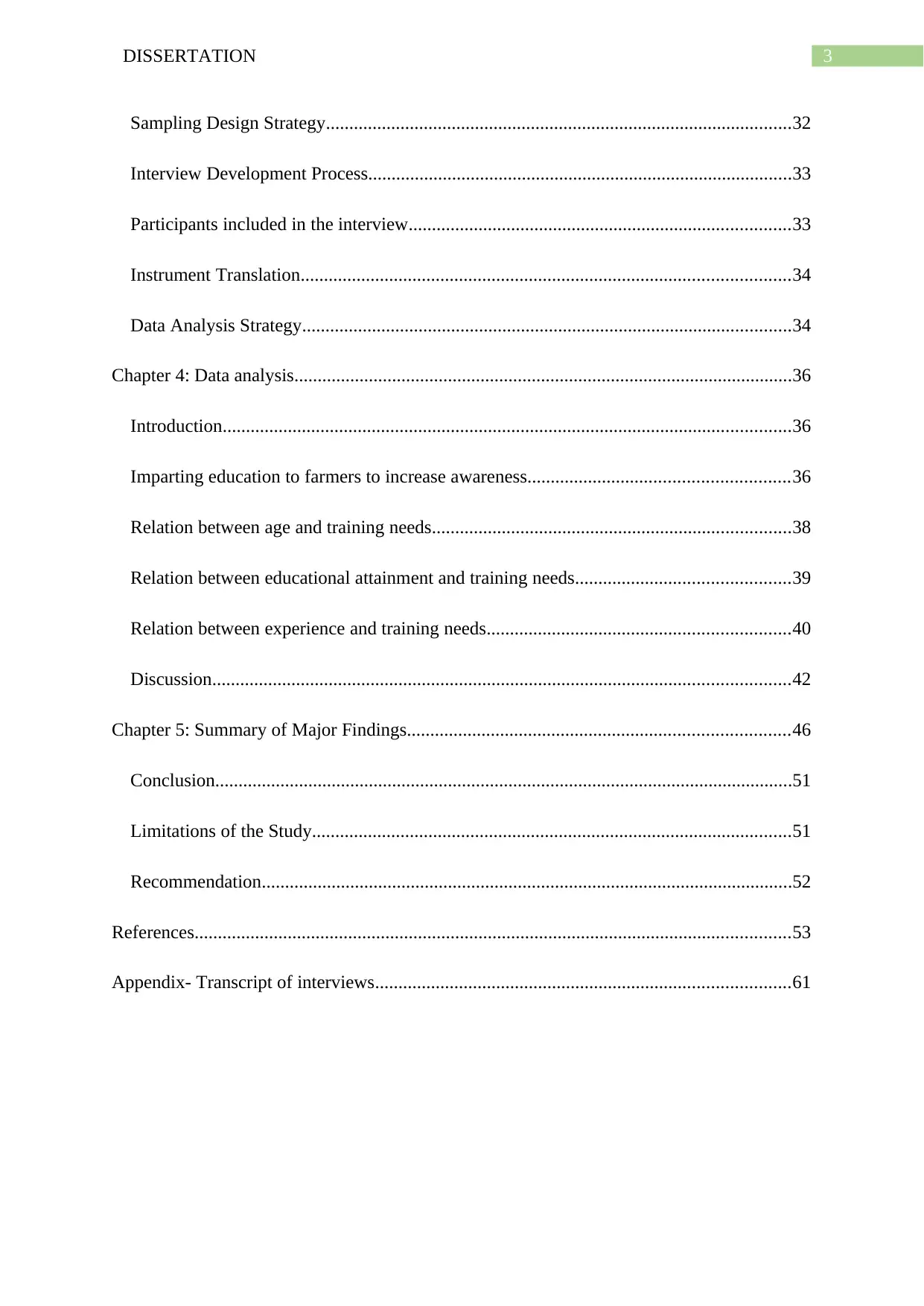
3DISSERTATION
Sampling Design Strategy....................................................................................................32
Interview Development Process...........................................................................................33
Participants included in the interview..................................................................................33
Instrument Translation.........................................................................................................34
Data Analysis Strategy.........................................................................................................34
Chapter 4: Data analysis...........................................................................................................36
Introduction..........................................................................................................................36
Imparting education to farmers to increase awareness........................................................36
Relation between age and training needs.............................................................................38
Relation between educational attainment and training needs..............................................39
Relation between experience and training needs.................................................................40
Discussion............................................................................................................................42
Chapter 5: Summary of Major Findings..................................................................................46
Conclusion............................................................................................................................51
Limitations of the Study.......................................................................................................51
Recommendation..................................................................................................................52
References................................................................................................................................53
Appendix- Transcript of interviews.........................................................................................61
Sampling Design Strategy....................................................................................................32
Interview Development Process...........................................................................................33
Participants included in the interview..................................................................................33
Instrument Translation.........................................................................................................34
Data Analysis Strategy.........................................................................................................34
Chapter 4: Data analysis...........................................................................................................36
Introduction..........................................................................................................................36
Imparting education to farmers to increase awareness........................................................36
Relation between age and training needs.............................................................................38
Relation between educational attainment and training needs..............................................39
Relation between experience and training needs.................................................................40
Discussion............................................................................................................................42
Chapter 5: Summary of Major Findings..................................................................................46
Conclusion............................................................................................................................51
Limitations of the Study.......................................................................................................51
Recommendation..................................................................................................................52
References................................................................................................................................53
Appendix- Transcript of interviews.........................................................................................61
Paraphrase This Document
Need a fresh take? Get an instant paraphrase of this document with our AI Paraphraser
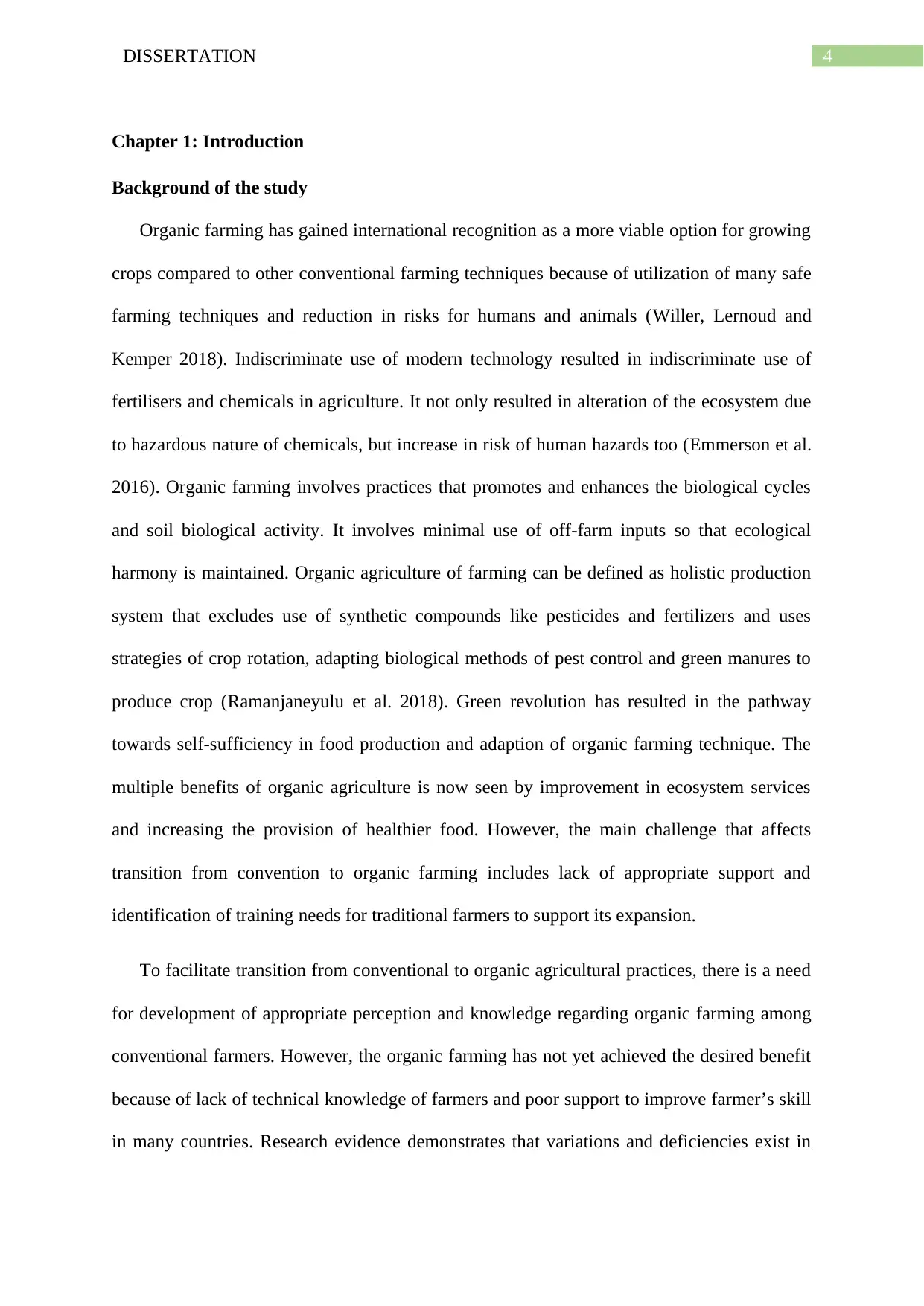
4DISSERTATION
Chapter 1: Introduction
Background of the study
Organic farming has gained international recognition as a more viable option for growing
crops compared to other conventional farming techniques because of utilization of many safe
farming techniques and reduction in risks for humans and animals (Willer, Lernoud and
Kemper 2018). Indiscriminate use of modern technology resulted in indiscriminate use of
fertilisers and chemicals in agriculture. It not only resulted in alteration of the ecosystem due
to hazardous nature of chemicals, but increase in risk of human hazards too (Emmerson et al.
2016). Organic farming involves practices that promotes and enhances the biological cycles
and soil biological activity. It involves minimal use of off-farm inputs so that ecological
harmony is maintained. Organic agriculture of farming can be defined as holistic production
system that excludes use of synthetic compounds like pesticides and fertilizers and uses
strategies of crop rotation, adapting biological methods of pest control and green manures to
produce crop (Ramanjaneyulu et al. 2018). Green revolution has resulted in the pathway
towards self-sufficiency in food production and adaption of organic farming technique. The
multiple benefits of organic agriculture is now seen by improvement in ecosystem services
and increasing the provision of healthier food. However, the main challenge that affects
transition from convention to organic farming includes lack of appropriate support and
identification of training needs for traditional farmers to support its expansion.
To facilitate transition from conventional to organic agricultural practices, there is a need
for development of appropriate perception and knowledge regarding organic farming among
conventional farmers. However, the organic farming has not yet achieved the desired benefit
because of lack of technical knowledge of farmers and poor support to improve farmer’s skill
in many countries. Research evidence demonstrates that variations and deficiencies exist in
Chapter 1: Introduction
Background of the study
Organic farming has gained international recognition as a more viable option for growing
crops compared to other conventional farming techniques because of utilization of many safe
farming techniques and reduction in risks for humans and animals (Willer, Lernoud and
Kemper 2018). Indiscriminate use of modern technology resulted in indiscriminate use of
fertilisers and chemicals in agriculture. It not only resulted in alteration of the ecosystem due
to hazardous nature of chemicals, but increase in risk of human hazards too (Emmerson et al.
2016). Organic farming involves practices that promotes and enhances the biological cycles
and soil biological activity. It involves minimal use of off-farm inputs so that ecological
harmony is maintained. Organic agriculture of farming can be defined as holistic production
system that excludes use of synthetic compounds like pesticides and fertilizers and uses
strategies of crop rotation, adapting biological methods of pest control and green manures to
produce crop (Ramanjaneyulu et al. 2018). Green revolution has resulted in the pathway
towards self-sufficiency in food production and adaption of organic farming technique. The
multiple benefits of organic agriculture is now seen by improvement in ecosystem services
and increasing the provision of healthier food. However, the main challenge that affects
transition from convention to organic farming includes lack of appropriate support and
identification of training needs for traditional farmers to support its expansion.
To facilitate transition from conventional to organic agricultural practices, there is a need
for development of appropriate perception and knowledge regarding organic farming among
conventional farmers. However, the organic farming has not yet achieved the desired benefit
because of lack of technical knowledge of farmers and poor support to improve farmer’s skill
in many countries. Research evidence demonstrates that variations and deficiencies exist in
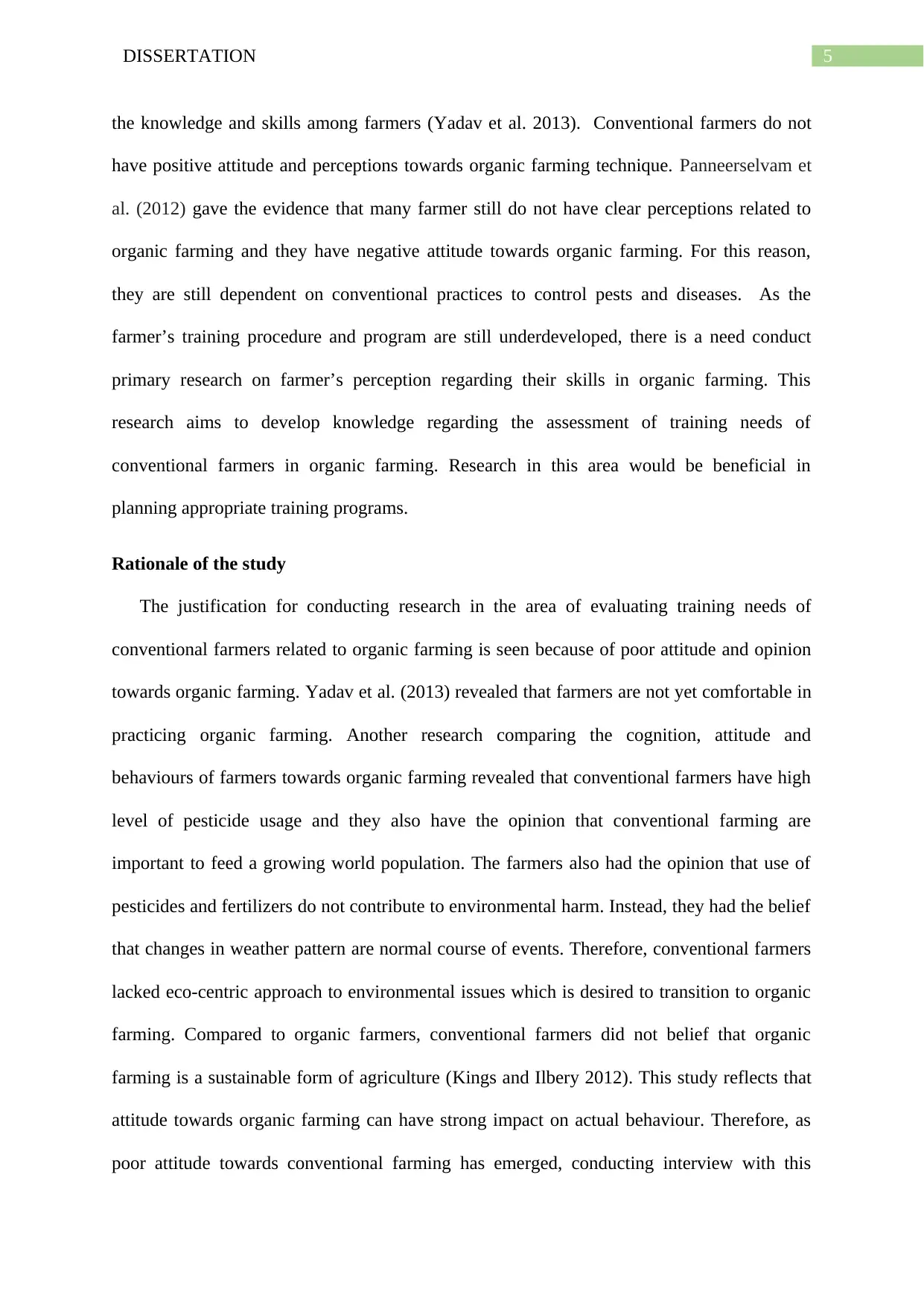
5DISSERTATION
the knowledge and skills among farmers (Yadav et al. 2013). Conventional farmers do not
have positive attitude and perceptions towards organic farming technique. Panneerselvam et
al. (2012) gave the evidence that many farmer still do not have clear perceptions related to
organic farming and they have negative attitude towards organic farming. For this reason,
they are still dependent on conventional practices to control pests and diseases. As the
farmer’s training procedure and program are still underdeveloped, there is a need conduct
primary research on farmer’s perception regarding their skills in organic farming. This
research aims to develop knowledge regarding the assessment of training needs of
conventional farmers in organic farming. Research in this area would be beneficial in
planning appropriate training programs.
Rationale of the study
The justification for conducting research in the area of evaluating training needs of
conventional farmers related to organic farming is seen because of poor attitude and opinion
towards organic farming. Yadav et al. (2013) revealed that farmers are not yet comfortable in
practicing organic farming. Another research comparing the cognition, attitude and
behaviours of farmers towards organic farming revealed that conventional farmers have high
level of pesticide usage and they also have the opinion that conventional farming are
important to feed a growing world population. The farmers also had the opinion that use of
pesticides and fertilizers do not contribute to environmental harm. Instead, they had the belief
that changes in weather pattern are normal course of events. Therefore, conventional farmers
lacked eco-centric approach to environmental issues which is desired to transition to organic
farming. Compared to organic farmers, conventional farmers did not belief that organic
farming is a sustainable form of agriculture (Kings and Ilbery 2012). This study reflects that
attitude towards organic farming can have strong impact on actual behaviour. Therefore, as
poor attitude towards conventional farming has emerged, conducting interview with this
the knowledge and skills among farmers (Yadav et al. 2013). Conventional farmers do not
have positive attitude and perceptions towards organic farming technique. Panneerselvam et
al. (2012) gave the evidence that many farmer still do not have clear perceptions related to
organic farming and they have negative attitude towards organic farming. For this reason,
they are still dependent on conventional practices to control pests and diseases. As the
farmer’s training procedure and program are still underdeveloped, there is a need conduct
primary research on farmer’s perception regarding their skills in organic farming. This
research aims to develop knowledge regarding the assessment of training needs of
conventional farmers in organic farming. Research in this area would be beneficial in
planning appropriate training programs.
Rationale of the study
The justification for conducting research in the area of evaluating training needs of
conventional farmers related to organic farming is seen because of poor attitude and opinion
towards organic farming. Yadav et al. (2013) revealed that farmers are not yet comfortable in
practicing organic farming. Another research comparing the cognition, attitude and
behaviours of farmers towards organic farming revealed that conventional farmers have high
level of pesticide usage and they also have the opinion that conventional farming are
important to feed a growing world population. The farmers also had the opinion that use of
pesticides and fertilizers do not contribute to environmental harm. Instead, they had the belief
that changes in weather pattern are normal course of events. Therefore, conventional farmers
lacked eco-centric approach to environmental issues which is desired to transition to organic
farming. Compared to organic farmers, conventional farmers did not belief that organic
farming is a sustainable form of agriculture (Kings and Ilbery 2012). This study reflects that
attitude towards organic farming can have strong impact on actual behaviour. Therefore, as
poor attitude towards conventional farming has emerged, conducting interview with this
⊘ This is a preview!⊘
Do you want full access?
Subscribe today to unlock all pages.

Trusted by 1+ million students worldwide
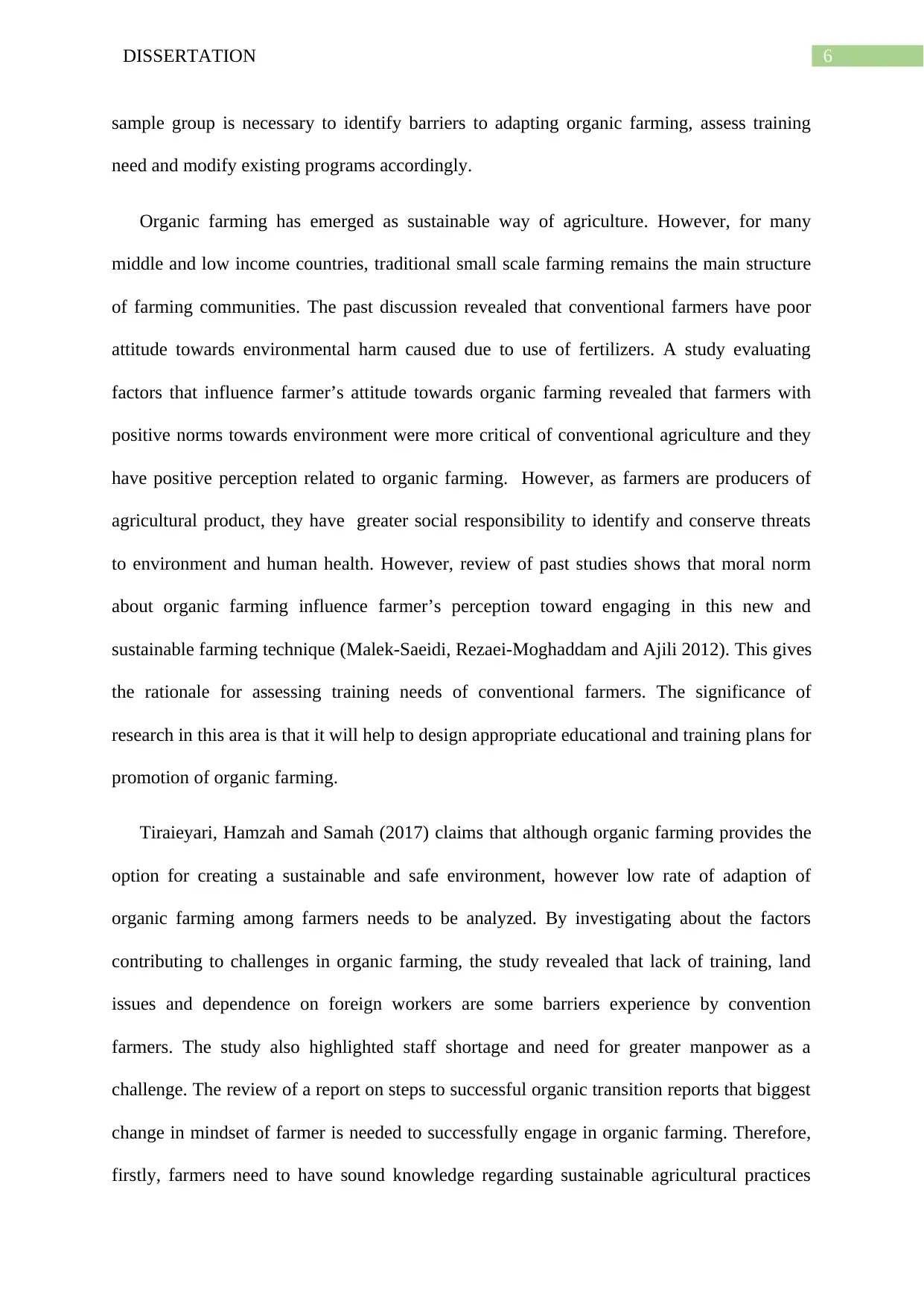
6DISSERTATION
sample group is necessary to identify barriers to adapting organic farming, assess training
need and modify existing programs accordingly.
Organic farming has emerged as sustainable way of agriculture. However, for many
middle and low income countries, traditional small scale farming remains the main structure
of farming communities. The past discussion revealed that conventional farmers have poor
attitude towards environmental harm caused due to use of fertilizers. A study evaluating
factors that influence farmer’s attitude towards organic farming revealed that farmers with
positive norms towards environment were more critical of conventional agriculture and they
have positive perception related to organic farming. However, as farmers are producers of
agricultural product, they have greater social responsibility to identify and conserve threats
to environment and human health. However, review of past studies shows that moral norm
about organic farming influence farmer’s perception toward engaging in this new and
sustainable farming technique (Malek-Saeidi, Rezaei-Moghaddam and Ajili 2012). This gives
the rationale for assessing training needs of conventional farmers. The significance of
research in this area is that it will help to design appropriate educational and training plans for
promotion of organic farming.
Tiraieyari, Hamzah and Samah (2017) claims that although organic farming provides the
option for creating a sustainable and safe environment, however low rate of adaption of
organic farming among farmers needs to be analyzed. By investigating about the factors
contributing to challenges in organic farming, the study revealed that lack of training, land
issues and dependence on foreign workers are some barriers experience by convention
farmers. The study also highlighted staff shortage and need for greater manpower as a
challenge. The review of a report on steps to successful organic transition reports that biggest
change in mindset of farmer is needed to successfully engage in organic farming. Therefore,
firstly, farmers need to have sound knowledge regarding sustainable agricultural practices
sample group is necessary to identify barriers to adapting organic farming, assess training
need and modify existing programs accordingly.
Organic farming has emerged as sustainable way of agriculture. However, for many
middle and low income countries, traditional small scale farming remains the main structure
of farming communities. The past discussion revealed that conventional farmers have poor
attitude towards environmental harm caused due to use of fertilizers. A study evaluating
factors that influence farmer’s attitude towards organic farming revealed that farmers with
positive norms towards environment were more critical of conventional agriculture and they
have positive perception related to organic farming. However, as farmers are producers of
agricultural product, they have greater social responsibility to identify and conserve threats
to environment and human health. However, review of past studies shows that moral norm
about organic farming influence farmer’s perception toward engaging in this new and
sustainable farming technique (Malek-Saeidi, Rezaei-Moghaddam and Ajili 2012). This gives
the rationale for assessing training needs of conventional farmers. The significance of
research in this area is that it will help to design appropriate educational and training plans for
promotion of organic farming.
Tiraieyari, Hamzah and Samah (2017) claims that although organic farming provides the
option for creating a sustainable and safe environment, however low rate of adaption of
organic farming among farmers needs to be analyzed. By investigating about the factors
contributing to challenges in organic farming, the study revealed that lack of training, land
issues and dependence on foreign workers are some barriers experience by convention
farmers. The study also highlighted staff shortage and need for greater manpower as a
challenge. The review of a report on steps to successful organic transition reports that biggest
change in mindset of farmer is needed to successfully engage in organic farming. Therefore,
firstly, farmers need to have sound knowledge regarding sustainable agricultural practices
Paraphrase This Document
Need a fresh take? Get an instant paraphrase of this document with our AI Paraphraser
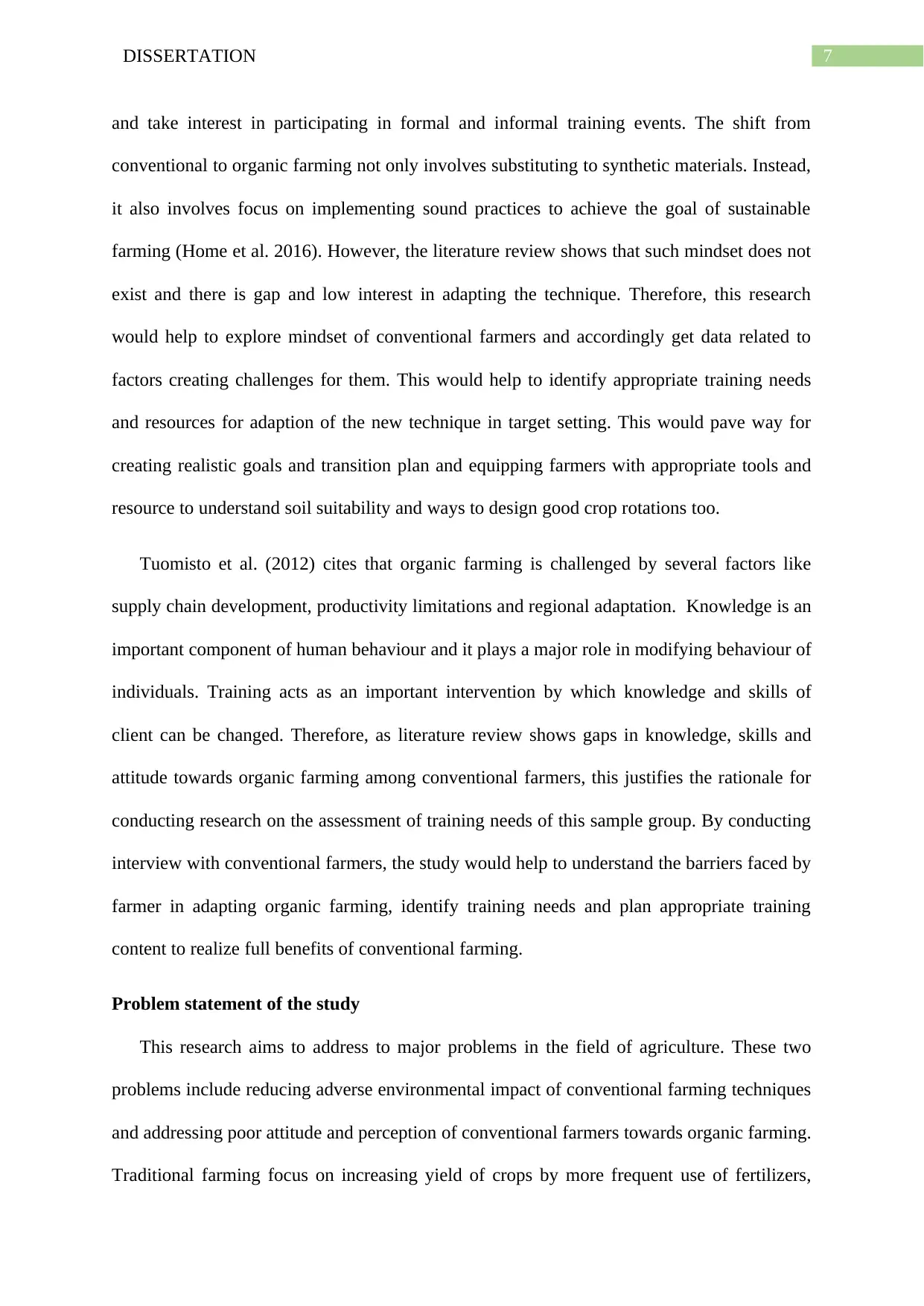
7DISSERTATION
and take interest in participating in formal and informal training events. The shift from
conventional to organic farming not only involves substituting to synthetic materials. Instead,
it also involves focus on implementing sound practices to achieve the goal of sustainable
farming (Home et al. 2016). However, the literature review shows that such mindset does not
exist and there is gap and low interest in adapting the technique. Therefore, this research
would help to explore mindset of conventional farmers and accordingly get data related to
factors creating challenges for them. This would help to identify appropriate training needs
and resources for adaption of the new technique in target setting. This would pave way for
creating realistic goals and transition plan and equipping farmers with appropriate tools and
resource to understand soil suitability and ways to design good crop rotations too.
Tuomisto et al. (2012) cites that organic farming is challenged by several factors like
supply chain development, productivity limitations and regional adaptation. Knowledge is an
important component of human behaviour and it plays a major role in modifying behaviour of
individuals. Training acts as an important intervention by which knowledge and skills of
client can be changed. Therefore, as literature review shows gaps in knowledge, skills and
attitude towards organic farming among conventional farmers, this justifies the rationale for
conducting research on the assessment of training needs of this sample group. By conducting
interview with conventional farmers, the study would help to understand the barriers faced by
farmer in adapting organic farming, identify training needs and plan appropriate training
content to realize full benefits of conventional farming.
Problem statement of the study
This research aims to address to major problems in the field of agriculture. These two
problems include reducing adverse environmental impact of conventional farming techniques
and addressing poor attitude and perception of conventional farmers towards organic farming.
Traditional farming focus on increasing yield of crops by more frequent use of fertilizers,
and take interest in participating in formal and informal training events. The shift from
conventional to organic farming not only involves substituting to synthetic materials. Instead,
it also involves focus on implementing sound practices to achieve the goal of sustainable
farming (Home et al. 2016). However, the literature review shows that such mindset does not
exist and there is gap and low interest in adapting the technique. Therefore, this research
would help to explore mindset of conventional farmers and accordingly get data related to
factors creating challenges for them. This would help to identify appropriate training needs
and resources for adaption of the new technique in target setting. This would pave way for
creating realistic goals and transition plan and equipping farmers with appropriate tools and
resource to understand soil suitability and ways to design good crop rotations too.
Tuomisto et al. (2012) cites that organic farming is challenged by several factors like
supply chain development, productivity limitations and regional adaptation. Knowledge is an
important component of human behaviour and it plays a major role in modifying behaviour of
individuals. Training acts as an important intervention by which knowledge and skills of
client can be changed. Therefore, as literature review shows gaps in knowledge, skills and
attitude towards organic farming among conventional farmers, this justifies the rationale for
conducting research on the assessment of training needs of this sample group. By conducting
interview with conventional farmers, the study would help to understand the barriers faced by
farmer in adapting organic farming, identify training needs and plan appropriate training
content to realize full benefits of conventional farming.
Problem statement of the study
This research aims to address to major problems in the field of agriculture. These two
problems include reducing adverse environmental impact of conventional farming techniques
and addressing poor attitude and perception of conventional farmers towards organic farming.
Traditional farming focus on increasing yield of crops by more frequent use of fertilizers,
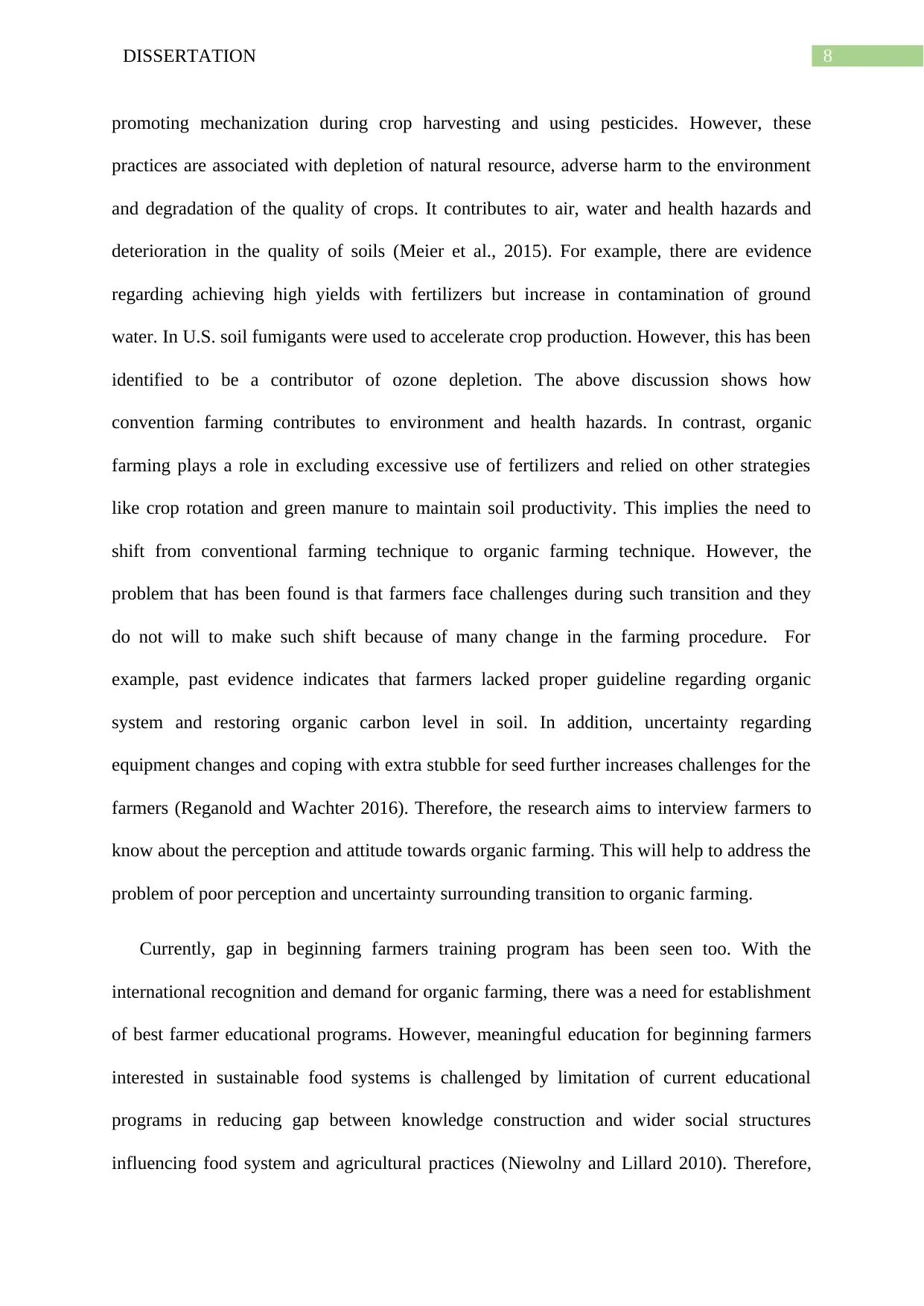
8DISSERTATION
promoting mechanization during crop harvesting and using pesticides. However, these
practices are associated with depletion of natural resource, adverse harm to the environment
and degradation of the quality of crops. It contributes to air, water and health hazards and
deterioration in the quality of soils (Meier et al., 2015). For example, there are evidence
regarding achieving high yields with fertilizers but increase in contamination of ground
water. In U.S. soil fumigants were used to accelerate crop production. However, this has been
identified to be a contributor of ozone depletion. The above discussion shows how
convention farming contributes to environment and health hazards. In contrast, organic
farming plays a role in excluding excessive use of fertilizers and relied on other strategies
like crop rotation and green manure to maintain soil productivity. This implies the need to
shift from conventional farming technique to organic farming technique. However, the
problem that has been found is that farmers face challenges during such transition and they
do not will to make such shift because of many change in the farming procedure. For
example, past evidence indicates that farmers lacked proper guideline regarding organic
system and restoring organic carbon level in soil. In addition, uncertainty regarding
equipment changes and coping with extra stubble for seed further increases challenges for the
farmers (Reganold and Wachter 2016). Therefore, the research aims to interview farmers to
know about the perception and attitude towards organic farming. This will help to address the
problem of poor perception and uncertainty surrounding transition to organic farming.
Currently, gap in beginning farmers training program has been seen too. With the
international recognition and demand for organic farming, there was a need for establishment
of best farmer educational programs. However, meaningful education for beginning farmers
interested in sustainable food systems is challenged by limitation of current educational
programs in reducing gap between knowledge construction and wider social structures
influencing food system and agricultural practices (Niewolny and Lillard 2010). Therefore,
promoting mechanization during crop harvesting and using pesticides. However, these
practices are associated with depletion of natural resource, adverse harm to the environment
and degradation of the quality of crops. It contributes to air, water and health hazards and
deterioration in the quality of soils (Meier et al., 2015). For example, there are evidence
regarding achieving high yields with fertilizers but increase in contamination of ground
water. In U.S. soil fumigants were used to accelerate crop production. However, this has been
identified to be a contributor of ozone depletion. The above discussion shows how
convention farming contributes to environment and health hazards. In contrast, organic
farming plays a role in excluding excessive use of fertilizers and relied on other strategies
like crop rotation and green manure to maintain soil productivity. This implies the need to
shift from conventional farming technique to organic farming technique. However, the
problem that has been found is that farmers face challenges during such transition and they
do not will to make such shift because of many change in the farming procedure. For
example, past evidence indicates that farmers lacked proper guideline regarding organic
system and restoring organic carbon level in soil. In addition, uncertainty regarding
equipment changes and coping with extra stubble for seed further increases challenges for the
farmers (Reganold and Wachter 2016). Therefore, the research aims to interview farmers to
know about the perception and attitude towards organic farming. This will help to address the
problem of poor perception and uncertainty surrounding transition to organic farming.
Currently, gap in beginning farmers training program has been seen too. With the
international recognition and demand for organic farming, there was a need for establishment
of best farmer educational programs. However, meaningful education for beginning farmers
interested in sustainable food systems is challenged by limitation of current educational
programs in reducing gap between knowledge construction and wider social structures
influencing food system and agricultural practices (Niewolny and Lillard 2010). Therefore,
⊘ This is a preview!⊘
Do you want full access?
Subscribe today to unlock all pages.

Trusted by 1+ million students worldwide
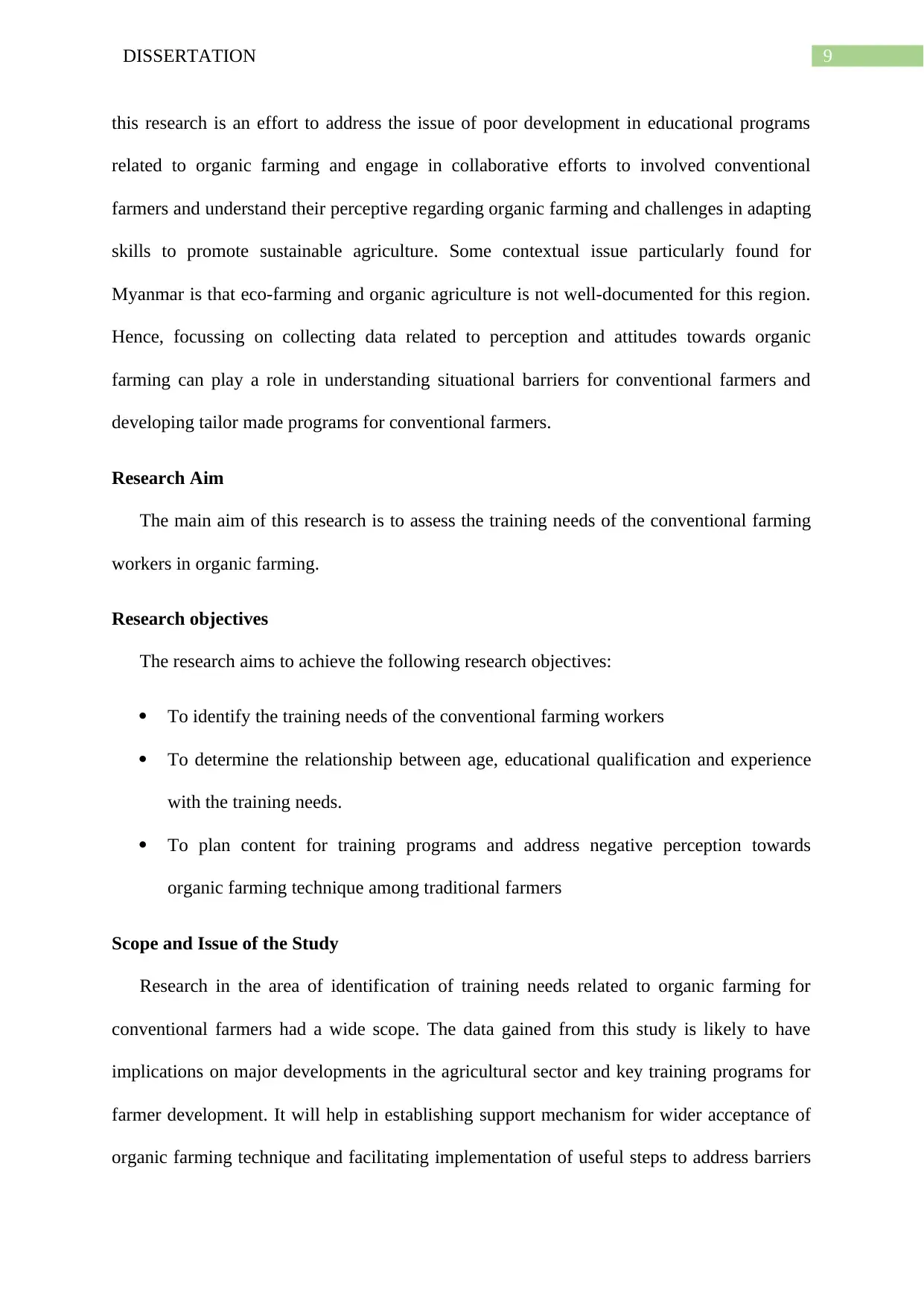
9DISSERTATION
this research is an effort to address the issue of poor development in educational programs
related to organic farming and engage in collaborative efforts to involved conventional
farmers and understand their perceptive regarding organic farming and challenges in adapting
skills to promote sustainable agriculture. Some contextual issue particularly found for
Myanmar is that eco-farming and organic agriculture is not well-documented for this region.
Hence, focussing on collecting data related to perception and attitudes towards organic
farming can play a role in understanding situational barriers for conventional farmers and
developing tailor made programs for conventional farmers.
Research Aim
The main aim of this research is to assess the training needs of the conventional farming
workers in organic farming.
Research objectives
The research aims to achieve the following research objectives:
To identify the training needs of the conventional farming workers
To determine the relationship between age, educational qualification and experience
with the training needs.
To plan content for training programs and address negative perception towards
organic farming technique among traditional farmers
Scope and Issue of the Study
Research in the area of identification of training needs related to organic farming for
conventional farmers had a wide scope. The data gained from this study is likely to have
implications on major developments in the agricultural sector and key training programs for
farmer development. It will help in establishing support mechanism for wider acceptance of
organic farming technique and facilitating implementation of useful steps to address barriers
this research is an effort to address the issue of poor development in educational programs
related to organic farming and engage in collaborative efforts to involved conventional
farmers and understand their perceptive regarding organic farming and challenges in adapting
skills to promote sustainable agriculture. Some contextual issue particularly found for
Myanmar is that eco-farming and organic agriculture is not well-documented for this region.
Hence, focussing on collecting data related to perception and attitudes towards organic
farming can play a role in understanding situational barriers for conventional farmers and
developing tailor made programs for conventional farmers.
Research Aim
The main aim of this research is to assess the training needs of the conventional farming
workers in organic farming.
Research objectives
The research aims to achieve the following research objectives:
To identify the training needs of the conventional farming workers
To determine the relationship between age, educational qualification and experience
with the training needs.
To plan content for training programs and address negative perception towards
organic farming technique among traditional farmers
Scope and Issue of the Study
Research in the area of identification of training needs related to organic farming for
conventional farmers had a wide scope. The data gained from this study is likely to have
implications on major developments in the agricultural sector and key training programs for
farmer development. It will help in establishing support mechanism for wider acceptance of
organic farming technique and facilitating implementation of useful steps to address barriers
Paraphrase This Document
Need a fresh take? Get an instant paraphrase of this document with our AI Paraphraser
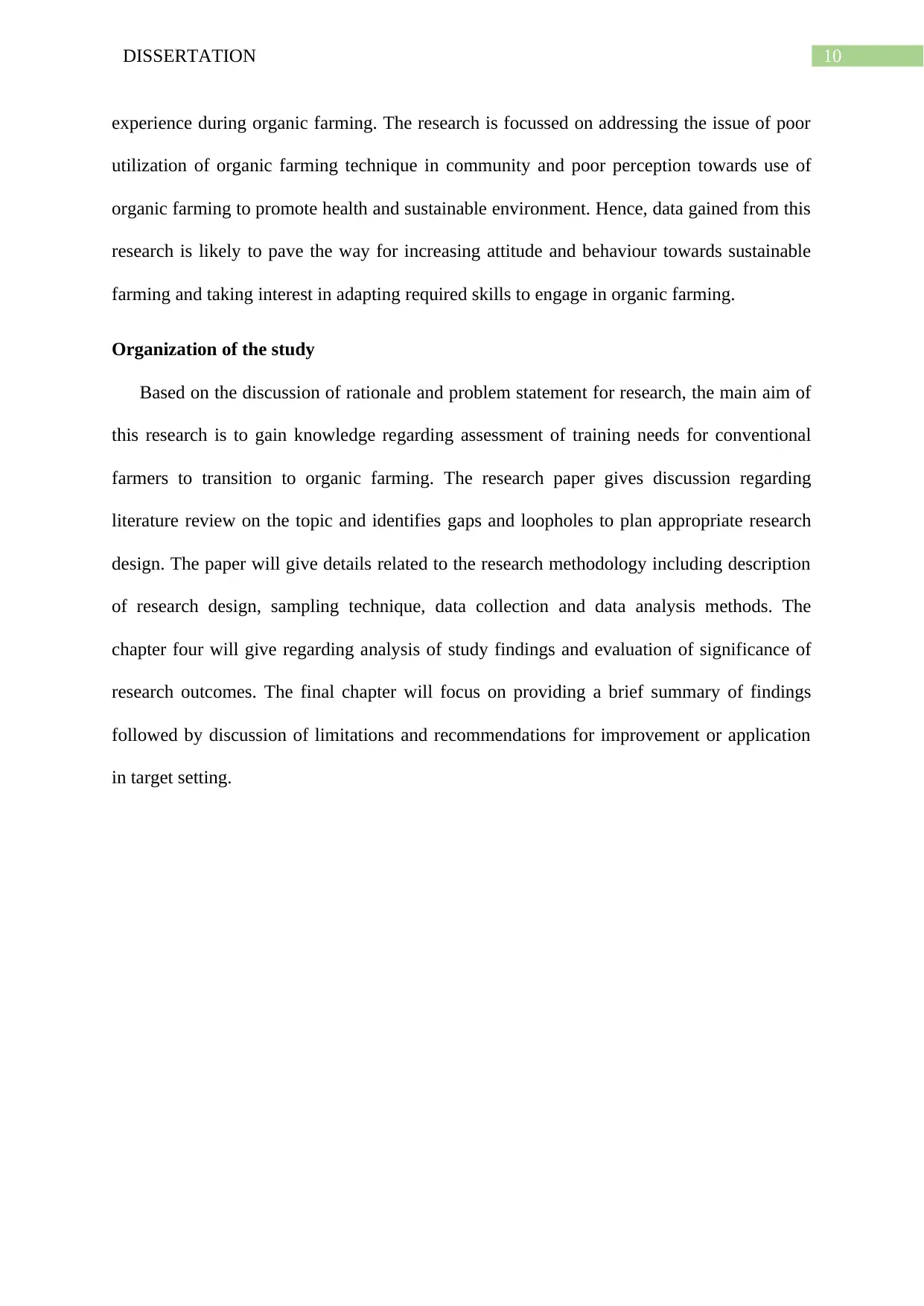
10DISSERTATION
experience during organic farming. The research is focussed on addressing the issue of poor
utilization of organic farming technique in community and poor perception towards use of
organic farming to promote health and sustainable environment. Hence, data gained from this
research is likely to pave the way for increasing attitude and behaviour towards sustainable
farming and taking interest in adapting required skills to engage in organic farming.
Organization of the study
Based on the discussion of rationale and problem statement for research, the main aim of
this research is to gain knowledge regarding assessment of training needs for conventional
farmers to transition to organic farming. The research paper gives discussion regarding
literature review on the topic and identifies gaps and loopholes to plan appropriate research
design. The paper will give details related to the research methodology including description
of research design, sampling technique, data collection and data analysis methods. The
chapter four will give regarding analysis of study findings and evaluation of significance of
research outcomes. The final chapter will focus on providing a brief summary of findings
followed by discussion of limitations and recommendations for improvement or application
in target setting.
experience during organic farming. The research is focussed on addressing the issue of poor
utilization of organic farming technique in community and poor perception towards use of
organic farming to promote health and sustainable environment. Hence, data gained from this
research is likely to pave the way for increasing attitude and behaviour towards sustainable
farming and taking interest in adapting required skills to engage in organic farming.
Organization of the study
Based on the discussion of rationale and problem statement for research, the main aim of
this research is to gain knowledge regarding assessment of training needs for conventional
farmers to transition to organic farming. The research paper gives discussion regarding
literature review on the topic and identifies gaps and loopholes to plan appropriate research
design. The paper will give details related to the research methodology including description
of research design, sampling technique, data collection and data analysis methods. The
chapter four will give regarding analysis of study findings and evaluation of significance of
research outcomes. The final chapter will focus on providing a brief summary of findings
followed by discussion of limitations and recommendations for improvement or application
in target setting.
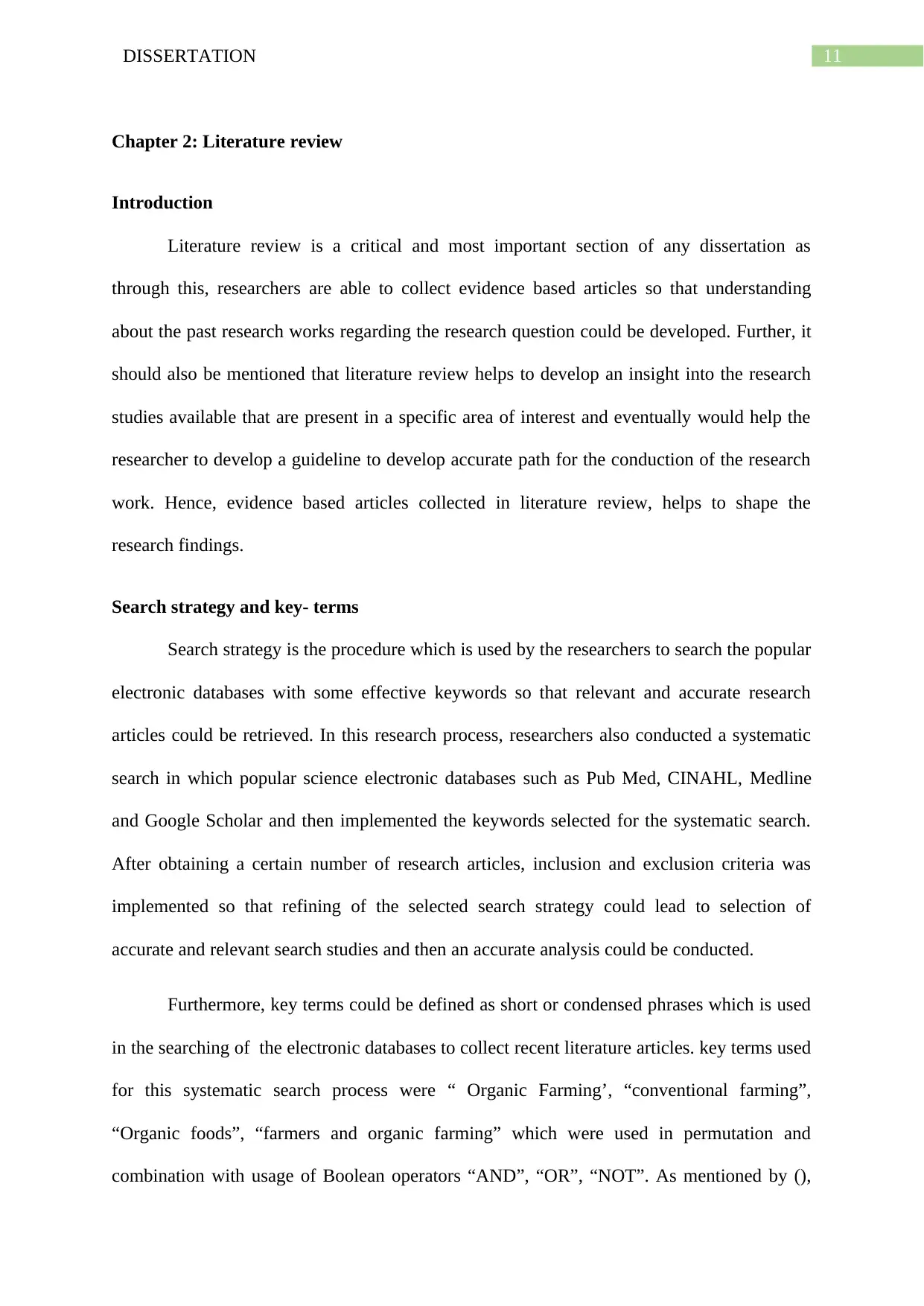
11DISSERTATION
Chapter 2: Literature review
Introduction
Literature review is a critical and most important section of any dissertation as
through this, researchers are able to collect evidence based articles so that understanding
about the past research works regarding the research question could be developed. Further, it
should also be mentioned that literature review helps to develop an insight into the research
studies available that are present in a specific area of interest and eventually would help the
researcher to develop a guideline to develop accurate path for the conduction of the research
work. Hence, evidence based articles collected in literature review, helps to shape the
research findings.
Search strategy and key- terms
Search strategy is the procedure which is used by the researchers to search the popular
electronic databases with some effective keywords so that relevant and accurate research
articles could be retrieved. In this research process, researchers also conducted a systematic
search in which popular science electronic databases such as Pub Med, CINAHL, Medline
and Google Scholar and then implemented the keywords selected for the systematic search.
After obtaining a certain number of research articles, inclusion and exclusion criteria was
implemented so that refining of the selected search strategy could lead to selection of
accurate and relevant search studies and then an accurate analysis could be conducted.
Furthermore, key terms could be defined as short or condensed phrases which is used
in the searching of the electronic databases to collect recent literature articles. key terms used
for this systematic search process were “ Organic Farming’, “conventional farming”,
“Organic foods”, “farmers and organic farming” which were used in permutation and
combination with usage of Boolean operators “AND”, “OR”, “NOT”. As mentioned by (),
Chapter 2: Literature review
Introduction
Literature review is a critical and most important section of any dissertation as
through this, researchers are able to collect evidence based articles so that understanding
about the past research works regarding the research question could be developed. Further, it
should also be mentioned that literature review helps to develop an insight into the research
studies available that are present in a specific area of interest and eventually would help the
researcher to develop a guideline to develop accurate path for the conduction of the research
work. Hence, evidence based articles collected in literature review, helps to shape the
research findings.
Search strategy and key- terms
Search strategy is the procedure which is used by the researchers to search the popular
electronic databases with some effective keywords so that relevant and accurate research
articles could be retrieved. In this research process, researchers also conducted a systematic
search in which popular science electronic databases such as Pub Med, CINAHL, Medline
and Google Scholar and then implemented the keywords selected for the systematic search.
After obtaining a certain number of research articles, inclusion and exclusion criteria was
implemented so that refining of the selected search strategy could lead to selection of
accurate and relevant search studies and then an accurate analysis could be conducted.
Furthermore, key terms could be defined as short or condensed phrases which is used
in the searching of the electronic databases to collect recent literature articles. key terms used
for this systematic search process were “ Organic Farming’, “conventional farming”,
“Organic foods”, “farmers and organic farming” which were used in permutation and
combination with usage of Boolean operators “AND”, “OR”, “NOT”. As mentioned by (),
⊘ This is a preview!⊘
Do you want full access?
Subscribe today to unlock all pages.

Trusted by 1+ million students worldwide
1 out of 72
Related Documents
Your All-in-One AI-Powered Toolkit for Academic Success.
+13062052269
info@desklib.com
Available 24*7 on WhatsApp / Email
![[object Object]](/_next/static/media/star-bottom.7253800d.svg)
Unlock your academic potential
Copyright © 2020–2026 A2Z Services. All Rights Reserved. Developed and managed by ZUCOL.





